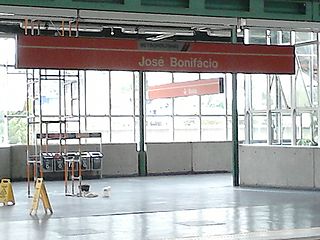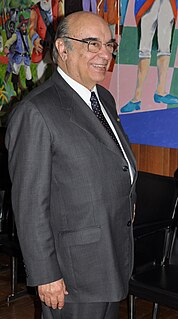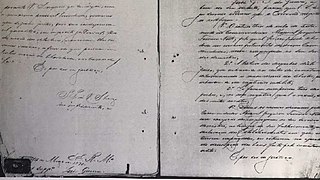Other uses
- José Bonifácio Esporte Clube, a football club
José Bonifácio may refer to:

Guarujá is a municipality in the São Paulo state of Brazil. It is part of the Metropolitan Region of Baixada Santista. The population is 322,750 in an area of 143.58 km2 (55.44 sq mi). This place name comes from the Tupi language, and means "narrow path". The population is highly urbanized.

José Bonifácio de Andrada e Silva was a Brazilian statesman, naturalist, mineralist, professor and poet, born in Santos, São Paulo, then part of the Portuguese Empire. He was one of the most important mentors of Brazilian independence, and his actions were decisive for the success of Emperor Pedro I. He supported public education, was an abolitionist and suggested that a new national capital be created in Brazil's underdeveloped interior. His career as naturalist was marked by the discovery of four new minerals.

José Bonifácio is a municipality in the state of São Paulo, Brazil. The population is of 37,366 inhabitants and the area is 859.94 km². The city belongs to the Microregion of São José do Rio Preto.

Antônio Frederico de Castro Alves was a Brazilian poet and playwright, famous for his abolitionist and republican poems. One of the most famous poets of the "Condorism", he won the epithet of "O Poeta dos Escravos".

Manuel Antônio Álvares de Azevedo, affectionately called "Maneco" by his close friends, relatives and admirers, was a Brazilian Romantic poet, short story writer, playwright and essayist, considered to be one of the major exponents of Ultra-Romanticism and Gothic literature in Brazil. His works tend to play heavily with opposite notions, such as love and death, platonism and sarcasm, sentimentalism and pessimism, among others, and have a strong influence of Musset, Chateaubriand, Lamartine, Goethe and – above all – Byron.
Rio Branco or Río Branco may refer to:
Andrada is a surname, as well as a Romanian feminine given name. Notable people with the surname include:

José Bonifácio de Andrada e Silva was a French-born Brazilian poet, teacher and senator. He is known as "the Younger" to distinguish him from his grand-uncle, José Bonifácio de Andrada e Silva, "the Elder" or "the Patriarch", a famous statesman who was one of the most important mentors of Brazilian independence.

Teófilo Odorico Dias de Mesquita was a Brazilian poet, journalist and lawyer, nephew of the famous Romantic author Gonçalves Dias.

The Royal Ironworks of St John, Ipanema was the first ironworks to be continuously operated in Brazil. It is located in Sorocaba region, near the city of Iperó, state of São Paulo. Ruins of the twin blast furnaces are well preserved and nearby is Fazenda Ipanema, a small settlement.

Martim Francisco Ribeiro de Andrada e Silva was a Brazilian politician who played a leading role in the declaration of Brazil's independence and in the government during the years that followed. He was twice Minister of Finance.

Carlos Antônio Napion, originally from Piedmont, was an engineer who became a general in the Portuguese army in Brazil. He set in motion the industry needed to create war materials in Brazil.

Events in the year 1928 in Brazil.

José Bonifácio de Andrada e Silva, also known as the Andrada Monument, is an outdoor bronze sculpture of José Bonifácio de Andrada by José Otavio Correia Lima, located at Bryant Park in Manhattan, New York. It is 9 feet (2.7 m) tall and weights approximately 4,000 lbs. Lima was selected through a competition that was sponsored by the Brazilian government, which also donated $60,000 for the surrounding plaza and granite base.

Bernardo Pereira de Vasconcelos was a Brazilian politician, journalist, judge and law expert of the Imperial era.

The Andradas Fort is a fortification in the Morro do Monduba, at Guarujá, in the state of São Paulo in Brazil.
Notable people named Bonifacio include:

José Bonifácio is a train station on CPTM Line 11-Coral, located in the district of José Bonifácio, East Side of São Paulo. The station also has an integrated urban bus terminal with lines that attend Areas 3 (yellow) and 4 (red).

Bonifácio José Tamm de Andrada was a Brazilian politician affiliated to Democrats (DEM), law academic, university professor, political scientist and journalist.

The Netto Question was the largest collective action for the liberation of slaves in the Americas. The lawsuit is related to the liberation of 217 slaves in Brazilian lands in the 1870s.